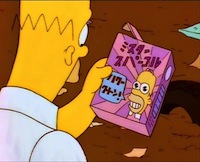| Hot Topics | |
|---|---|
Japanese stocks plunge
22 posts
• Page 1 of 1
Correct me if I'm wrong because I most often am, but I'm sure I just heard CNN report how Prime Minister Aso said something along the lines of, "I'm scared for the future". Can anyone confirm this or any other bone headed statements he may have made this afternoon?
In the beginning the universe was created. This has made a lot of people very angry and been widely regarded as a bad move - Douglas Adams
-

Midwinter - Maezumo
- Posts: 649
- Joined: Thu Mar 10, 2005 10:06 pm
-

Doctor Stop - Maezumo
- Posts: 1837
- Joined: Tue Jan 16, 2007 10:12 pm
- Location: Up Shit Creek Somewhere
another plunge today
Nikkei Logs Biggest Percentage Drop since 1987 Black Monday
http://www.japancorp.net/Article.Asp?Art_ID=20267
US President lame dumbass George W is due to make an address to the American people later in the day
Nikkei Logs Biggest Percentage Drop since 1987 Black Monday
http://www.japancorp.net/Article.Asp?Art_ID=20267
Tokyo, Oct 10, 2008 (Jiji Press) - The key Nikkei average dived 9.6 pct on the Tokyo Stock Exchange Friday, suffering the biggest single-day percentage loss since the day after the Black Monday market crash in October 1987, amid intense fears that the unfolding credit crisis may tip the global economy into recession.
The 225-issue Nikkei average ended down 881.06 points from Thursday at 8,276.43, the lowest finish since May 28, 2003. The index, which fell 45.83 points on Thursday, shed more than 1,000 points briefly.
The Nikkei extended its losing streak to a seventh trading day, skidding 3,091.83 points, or 27.2 pct, over that stretch.
The TOPIX index of all first-section issues, a 6.10-point winner in the previous session, plunged 64.25 points, or 7.1 pct, to 840.86.
The sharp losses of the key market gauges triggered a temporary suspension of index futures trading.
"This is mind-boggling," said Nagayuki Yamagishi, equity strategist at Mitsubishi UFJ Securities Co. "Fear-stricken investors scrambled to flee risky assets for cash."
Heavy selling swamped the market as fresh evidence of rapidly spreading economic ills around the world rattled investors.
In the United States, Standard & Poor's said Thursday it may cut its ratings on General Motors Corp. and Ford Motor Co. deeper into junk territory. The warning increased fears about their survival and contributed to the Dow Jones industrial average's 7.3 pct tumble overnight.
In Japan, news about Yamato Life Insurance Co.'s effective bankruptcy, as well as the first failure of a Japanese real estate investment trust fund, fueled concern that the effects of the global financial turmoil are now in full force reaching Japan, a country previously though to be unscathed by the subprime mess.
The yen's spike against the dollar and the euro also clouds the outlook of the export-dependent Japanese economy, brokers said.
Teruhisa Ishikawa, equity manager at Mizuho Investors Securities Co., that it is pointless to predict when and where the market will hit bottom. "The market will rebound only when global policymakers announce powerful policy steps," he said.
Ishikawa cited market speculation that the U.S. government will soon announce plans for capital infusions into banks, possibly over this weekend when finance chiefs from the Group of Seven key industrialized nations meet in Washington.
But Yamagishi of Mitsubishi UFJ said capital injections alone will not restore investor confidence if the step is not accompanied by economic stimulus measures to save the economy from recession.
Losing issues overwhelmed winners 1,499 to 175 on the TSE's first section, while 40 issues were flat.
Volume grew to 3,274 million shares from Thursday's 2,918 million shares.
Insurance groups T&D, Sompo Japan and Tokio Marine plummeted as the failure of Yamato Life sparked concern about the health of the industry.
Toyota, Nissan and Honda plunged as the rating warnings for the U.S. auto giants highlighted the dim outlook for the global auto industry.
On the other hand, trading houses Mitsubishi, Itochu and Marubeni finished up, drawing some buybacks.
Major convenience store chain FamilyMart rose thanks to brisk earnings for March-August.
In index futures trading, the key December contract on the Nikkei average closed down 1,180 points at 8,020 on the Osaka Securities Exchange, after the first brief trading suspension since Sept. 11 terrorist attacks in 2001.
US President lame dumbass George W is due to make an address to the American people later in the day
-

Buraku - Maezumo
- Posts: 3921
- Joined: Thu May 13, 2004 9:25 am
G7 pledges action to save banks
http://www.independent.co.uk/news/business/news/g7-pledges-action-to-save-banks-957870.html
http://www.independent.co.uk/news/business/news/g7-pledges-action-to-save-banks-957870.html
-

Buraku - Maezumo
- Posts: 3921
- Joined: Thu May 13, 2004 9:25 am
Bailout=FAIL
Mr. Sparkle
Member - FG Iliterati
"I am interested in the relationship of the lower part of the human body and the lower part of the social structure on which the reality of daily Japanese life obstinately supports itself."
- Shohei Imamura
Member - FG Iliterati
"I am interested in the relationship of the lower part of the human body and the lower part of the social structure on which the reality of daily Japanese life obstinately supports itself."
- Shohei Imamura
-

mr. sparkle - Maezumo
- Posts: 1274
- Joined: Sun Sep 22, 2002 3:21 am
It is a big lie that the more faster public money is invested, the more faster economic is recovered. Untill the prices of real estates hit the bottom, any public money is not useful.
-

Takechanpoo - Posts: 4294
- Images: 4
- Joined: Fri Oct 06, 2006 10:47 pm
- Location: Tama Prefecture(多摩県)
Takechanpoo wrote:It is a big lie that the more faster public money is invested, the more faster economic is recovered. Untill the prices of real estates hit the bottom, any public money is not useful.
um... coughcough......as of 12pm (12:00 hours) Monday, October 13 EST the dow is +525.36. The major banks dumped a shitload of money back in. The guys who bought last week (wink) are now in the green. With UFJ, the FED, and the EU throwing money around things over the next five only look good.
-

wuchan - Posts: 2015
- Joined: Tue Jun 17, 2008 11:19 pm
- Location: tied to a chair in a closet at the local koban
Recession fears send markets down
http://www.stuff.co.nz/stuff/4729126a6026.html
http://www.stuff.co.nz/stuff/4729126a6026.html
Wall St has once more seen a session of falls in overnight trading and Europe's two day rally dramatically reversed as fears of global recession take hold, fuelled by Federal Reserve chairman Ben Bernanke talking up the "significant threat" facing the US economy.
Such is the fragility of confidence at the moment that in the UK the FTSE 100 lost 7.2 percent erasing a big chunk of the near 12 percent rebound seen in the previous two sessions.
"It's all or nothing with the FTSE at the moment, with yet another large one-day movement," said Tim Hughes, Head of Sales Trading at IG Index.
"The comedown after the euphoria of the multi-billion pound bail-outs earlier this week seemed inevitable, although a sharp rise in the latest UK unemployment figures hasn't helped matters," he added.
British unemployment figures showed their biggest rise in 17 years in the three months to August, taking the jobless rate to its highest level in eight years.
In the US the Dow Jones industrial average was down over 400 points, slipping under 8,900.
The Standard & Poor's 500 Index is also down over 60 points, trading in the low to mid 900 range.
The Nasdaq Composite Index has shed over 80 points, to trade around the 1690 - 1700 point range.
US sentiment turned negative after the Fed's Ben Bernanke said the turmoil in credit markets poses a "significant threat" to an already slowing US economy - in a speech designed to signal that the Fed is prepared to make more rate cuts to help the economy.
In remarks prepared for delivery to the Economic Club of New York, Bernanke said it will take some time to restore normal flows of credit and he pledged the US central bank would continue to act aggressively to fight the crisis.
"By restricting flows of credit to households, businesses, and state and local governments, the turmoil in financial markets and the funding pressures on financial firms pose a significant threat to economic growth," Bernanke said.
"We will continue to use all the tools at our disposal to improve market functioning and liquidity, to reduce pressures in key credit and funding markets and to complement the steps the (US) Treasury and foreign governments will be taking to strengthen the financial system," he said.
Looking at the reaction on the markets to recessionary stimulus on both sides of the Atlantic, Angus Campbell, head of sales at Capital Spreads said: "Today is one of those days that is indicating we are not at the end of a bear market."
"There are still recessionary fears. There are still fears about the global outlook for equities. You would get big, big rises after big, big falls, but the big, big rises won't be able to cancel out all the falls that we see for quite a while."
Meanwhile in Asia Hong Kong's Hang Seng dropped 5 percent
while in Japan the Nikkei average rose 1.1 percent on Wednesday as in Japan the sense of panic over the financial crisis eased.
"The worst is probably over for now after the markets confirmed that governments have decided not to let banks fail as they announced a series of measures," said Soichiro Monji, a chief strategist at Daiwa SB Investments.
However look for a negative reaction here too once it reopens today and digests the US and European movements.
Underlining the fragility in the markets, it is of note that the movers helping push the Nikkei up were so-called defensive stocks such as drugmakers including Takeda Pharmaceutical whereas the traditional powerhouses of the economy such as exporters like Sony Corp slid amid worries about the global economy.
Mazda tumbled more than 9 percent after a report that it has scrapped plans to build a second US factory amid deteriorating sales.
And significantly, Monji highlighted that "the gains are still due to short-covering."
The S&P/ASX 200 Index eased back 35.20 points, or 0.8 percent, to 4,300 at the close.
The New Zealand stock market trimmed some of yesterday's gains to finish the day 1.5 percent lower. The NZX 50 index ended the day down 44.332 points, or 1.53 percent at 2904.642.
-

Buraku - Maezumo
- Posts: 3921
- Joined: Thu May 13, 2004 9:25 am
To preserve U.S economy, China, Japan and GCC have to continue buying 2.3 quadrillions of U.S government bond every year from now on. But needless to say, it can't do. So it is a decided fact that U.S economy be bankrupted and Dollar be collapse. World should think about the next phase. Concretely about war.
I cannot think Anglo-Saxon dudes obediently accept their defeat as an empire. They probably cause WW3. Top management of Washington must has already been thinking about it and moved to do.
World has to pin down Anglo-Saxons not to case WW3.
I cannot think Anglo-Saxon dudes obediently accept their defeat as an empire. They probably cause WW3. Top management of Washington must has already been thinking about it and moved to do.
World has to pin down Anglo-Saxons not to case WW3.
-

Takechanpoo - Posts: 4294
- Images: 4
- Joined: Fri Oct 06, 2006 10:47 pm
- Location: Tama Prefecture(多摩県)
Takechanpoo wrote:To preserve U.S economy, China, Japan and GCC have to continue buying 2.3 quadrillions of U.S government bond every year from now on. But needless to say, it can't do. So it is a decided fact that U.S economy be bankrupted and Dollar be collapse. World should think about the next phase. Concretely about war.
I cannot think Anglo-Saxon dudes obediently accept their defeat as an empire. They probably cause WW3. Top management of Washington must has already been thinking about it and moved to do.
World has to pin down Anglo-Saxons not to case WW3.
Don't get your knickers in a twist, Take. The US dollar fell by 50% against most major currencies following the Plaza Accord in 1985 and 23 years on it's still Big Daddy. Japan, China, Vietnam...all the East Asian sweatshop countries need to provide EZ financing for fatass Americans to buy their doodads.
-

Catoneinutica - Posts: 1953
- Joined: Tue Jan 24, 2006 12:23 pm
Takechanpoo wrote:They probably cause WW3.
Hey Take, I hadn't thought of that. Good idea, l'll get right on it!
"There are those that learn by reading. Then a few who learn by observation. The rest have to piss on an electric fence and find out for themselves!"- Will Rogers

-

Greji - Posts: 14357
- Joined: Fri Jun 25, 2004 3:00 pm
- Location: Yoshiwara
rough day ahead
Sony shakey
Mazda down over 10%
Nintendo worried
Toyota concerned on shrinking growth
Okuma machine tools maker down again
Mitsubishi UFJ financial group might need fresh capital
Isuzu Motors down 11 %
Nikkei tumbling because of a strong yen and some crap economic data
Sony shakey
Mazda down over 10%
Nintendo worried
Toyota concerned on shrinking growth
Okuma machine tools maker down again
Mitsubishi UFJ financial group might need fresh capital
Isuzu Motors down 11 %
Nikkei tumbling because of a strong yen and some crap economic data
-

Buraku - Maezumo
- Posts: 3921
- Joined: Thu May 13, 2004 9:25 am
I think Take has a point.
The last time the shit hit the fan this hard, fascism raised it's head, and fed off economic instability and unemployment.
Maybre we should start listening more carefully to what the clowns in those black trucks are screaming.

The last time the shit hit the fan this hard, fascism raised it's head, and fed off economic instability and unemployment.
Maybre we should start listening more carefully to what the clowns in those black trucks are screaming.
The web is spun,
The net's been cast.
You are the prey,
Watch your ass!
The net's been cast.
You are the prey,
Watch your ass!
-

CrankyBastard - Maezumo
- Posts: 1267
- Joined: Mon Jul 03, 2006 12:10 pm
- Location: Edge of the Bay

Source: KBC Securities
Trivia enthusiasts might like to know that today was a first for the stock market. Whenever the TOPIX index (not the Nikkei Stock Average) has fallen by 5% or more in a trading day, it has always gone up, albeit often not by much, the following day. Today is the first time the index has fallen. You'll also notice from the table above that six of the 17 largest one day falls in the Topix index have occurred in 2008.
-

Mulboyne - Posts: 18608
- Joined: Thu May 06, 2004 1:39 pm
- Location: London
Asia stocks dive to 4-yr lows
Asian shares extended losses on Monday, with Japan's Nikkei briefly hitting its lowest since 1982, as central bank policy moves including a record rate cut in South Korea were not enough to allay fears of a global recession.
Trading was chaotic amid continued doubts over whether governments can stem a crisis that is menacing financial markets, worldwide economic growth and company earnings.
Japan pledged fresh measures on Monday to try to shield the world's second-biggest economy from the financial crisis and said the Group of Seven would issue a joint statement on the yen, which has risen rapidly as investors flee riskier investments.
-

Buraku - Maezumo
- Posts: 3921
- Joined: Thu May 13, 2004 9:25 am
http://www.monstersandcritics.com/news/business/news/article_1442723.php/Tokyo_stocks_continue_losses_on_strong_yen_economic_worries__Roundup__
Tokyo - The Tokyo stock market extended its losing streak to end Thursday trading lower as the market sentiment was dampened due to persistent worries over the US economy and the yen trading stronger against other currencies.
The Nikkei 225 Stock Average tumbled 456.87 points, or 5.25 per cent, to close at 8,238.64, a two-week low.
The broader Topix index of all first-section issues was also down 37.7 points, or 4.31 per cent, to 837.53.
Exporters were hurt by the stronger yen as it shaves off Japanese firms' earnings overseas.
On currency markets at midday (0300 GMT), the dollar traded at 95.63-68 yen, down from Wednesday's 5 pm quote of 97.94-97 yen.
The euro was quoted at 1.2462-67 dollars, down from Wednesday's 5 pm quote of 1.2603-06 dollars, and at 119.19-24 yen, down from 123.46-50 yen.
Tokyo - The Tokyo stock market extended its losing streak to end Thursday trading lower as the market sentiment was dampened due to persistent worries over the US economy and the yen trading stronger against other currencies.
The Nikkei 225 Stock Average tumbled 456.87 points, or 5.25 per cent, to close at 8,238.64, a two-week low.
The broader Topix index of all first-section issues was also down 37.7 points, or 4.31 per cent, to 837.53.
Exporters were hurt by the stronger yen as it shaves off Japanese firms' earnings overseas.
On currency markets at midday (0300 GMT), the dollar traded at 95.63-68 yen, down from Wednesday's 5 pm quote of 97.94-97 yen.
The euro was quoted at 1.2462-67 dollars, down from Wednesday's 5 pm quote of 1.2603-06 dollars, and at 119.19-24 yen, down from 123.46-50 yen.
-

Buraku - Maezumo
- Posts: 3921
- Joined: Thu May 13, 2004 9:25 am
22 posts
• Page 1 of 1
Who is online
Users browsing this forum: No registered users and 82 guests



